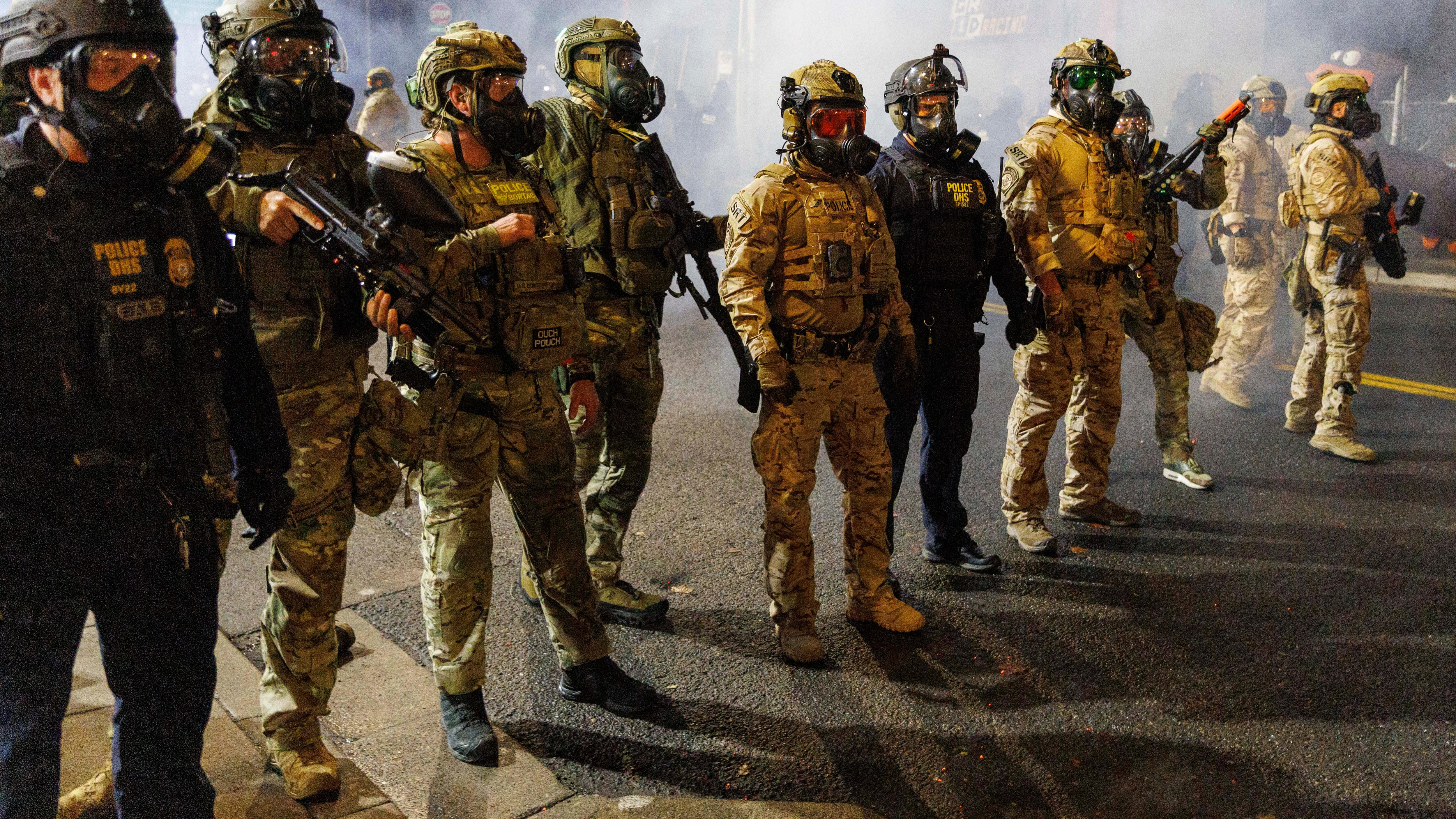He settled back in his chair, a plastic water bottle handy as he awaited another question from an attorney for the state of Oregon. Earlier he’d been prompted to recount his career, and recalled serving for decades in the military, including as a Green Beret in Iraq around 2003, then going to work in Africa as a military contractor, and to teach the ROTC program at the University of Washington.
Thirteen years ago, Robert Cantu said, he joined the Federal Protective Service. He rose through the ranks and in 2023 became deputy director of Region 10, helping oversee the agency’s work protecting federal facilities in Idaho, Alaska, Washington and Oregon.
Identified in the trial as “RC” even though his actual name was little mystery to many in the courtroom, Cantu had answered a range of questions from a selection of the attorneys convened Thursday for day two in the hastily arranged trial of Oregon v. Trump.
Now the query before him was this: “Are you the most knowledgeable individual at [the Department of Homeland Security] about the security of the [U.S. Immigration and Customs Enforcement] building in Portland?”
“I would be one,” Cantu answered. ”Yes.”
“And your supervisor, the regional director, would be the other, correct?”
“Yes.”
The Oregon lawyer went on: Was it true that Cantu and his boss were not consulted before President Donald Trump said he would send the National Guard to Portland?
Cantu affirmed this was true: They were not consulted.
Over roughly seven hours of testimony Thursday from Cantu and two other law enforcement witnesses, a small army of lawyers sought to sharpen their chosen narratives about the security situation at the Portland ICE facility during a span of several months, from June to October of this year.
Justifying the decision to federalize Oregon National Guard members for a mission to Portland, Trump administration officials have argued the situation on the ground was out of control.
State and local officials, who sued to block this mission, maintained that for weeks leading to the call-up, the protests outside the facility were often perfectly lawful, and when they weren’t, police were able to step in.
With the trial expected to end Friday, U.S. District Judge Karin J. Immergut, who earlier issued a temporary block on the deployment, is set to decide whether she should turn this into a more durable injunction—or let the deployment proceed.
She will, she said, grant great “deference” to Trump as she assesses whether his decision to federalize U.S. troops for the mission to Portland was based on a plausible, good-faith assessment of the conditions in the city at the time of the call-up.
And given that her decision is almost certain to face scrutiny on appeal, the trial, as a practical matter, also serves to establish a broader foundation of facts on which jurists may later base their legal analyses.
The scope of relevant information remains a contested legal question. Two appeals court judges last week indicated they thought Immergut should be factoring in events over a broader time period, including June, when protests got particularly violent and at one point Portland police declared a riot.
That opinion was recently canceled, as the 9th U.S. Circuit Court of Appeals moved to rehear the matter as a bigger group of judges. But Immergut indicated Thursday that she remained mindful of the arguments made in the now-vacated ruling: The whole time frame from June to the present, she said she now assumes, has relevance for the decision before her.
Attorneys for the plaintiffs—Portland, Oregon and California—continued to press a few now-familiar lines of argument. The feds, they say, have offered inaccurate information about the number of officers they redirected to Portland amid the protests. And, as Cantu acknowledged from the stand, personnel shortages in the FPS are a systemic problem, dating back years.
Plaintiffs further argue that federal officials have needlessly inflamed protester tensions by using disproportionate force, creating a bad-faith pretext for the troop call-up.
And they presented documentation, sourced from federal reports, showing that the few protesters remaining at the ICE facility in the days leading up to Trump’s Sept. 27 announcement that he would sent troops to protect “War ravaged” Portland were at times outnumbered by federal officials.
Cantu’s testimony offered grist for both sides. He acknowledged being surprised when he learned the troops would be mobilized. And yet, he said, he expected their arrival would allow numerous federal law enforcement officials to return to their primary duties.
Federal officers guarding the facility were being stretched thin in a way that was not sustainable, he said. It had been a stressful few months. He and another federal officer, identified as a Commander, both recalled the persistent protester tactic of blocking the driveway to the facility. They described vandalism, wounded officers, and frequent violent threats. Protesters, Cantu testified, said “some of the most vulgar, foul, racial slurs, constantly through the day, throughout the night, on bullhorns.”
And, while local police have their own perspective on this, it was clear he and his colleagues resented what they perceived as the lack of meaningful help from Portland police wary to run afoul of local laws barring them from assisting in immigration enforcement. By way of contrast, Cantu recalled a large and unruly anti-ICE protest in Spokane, and how police there deployed dozens of officers and made targeted arrests and successfully protected the federal facility.
John Bailey, an attorney for the Trump administration, asked: “Do you think you would get that kind of support in Portland?”
Cantu responded: “No.”

